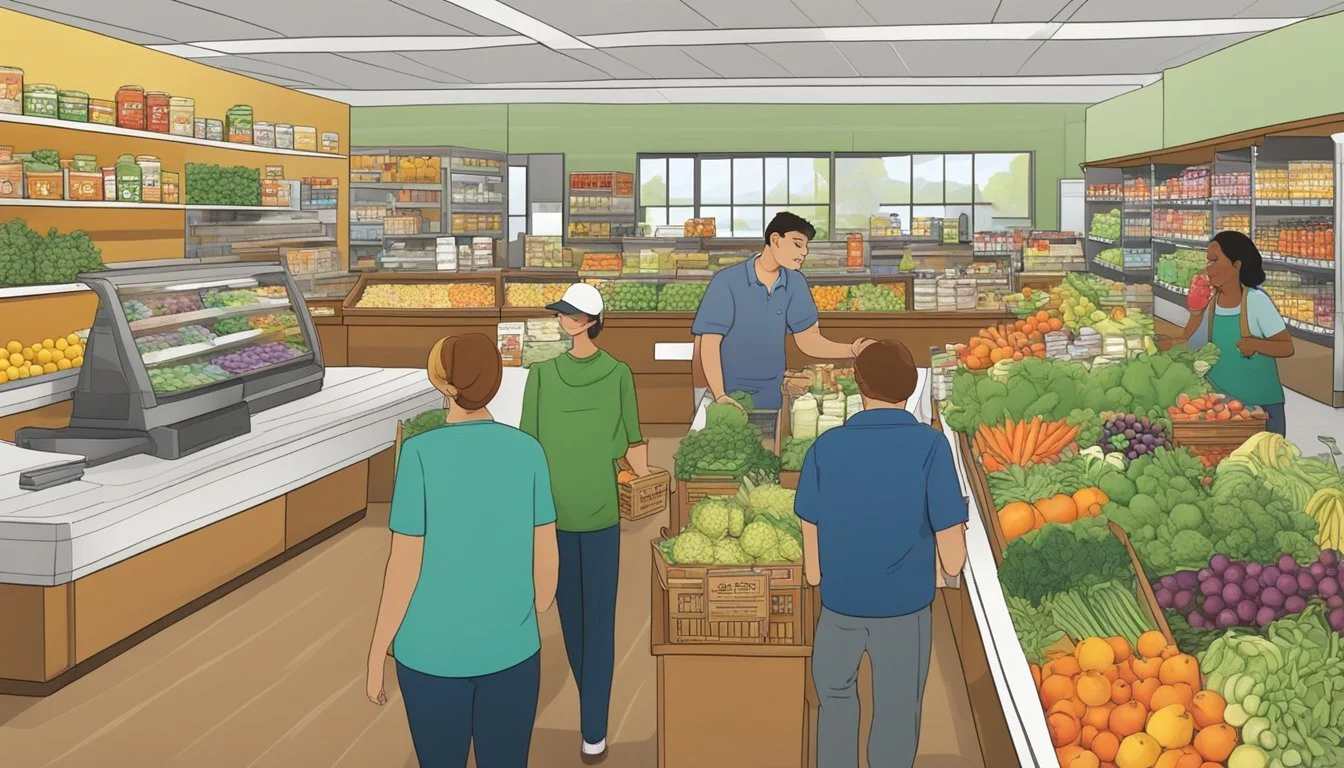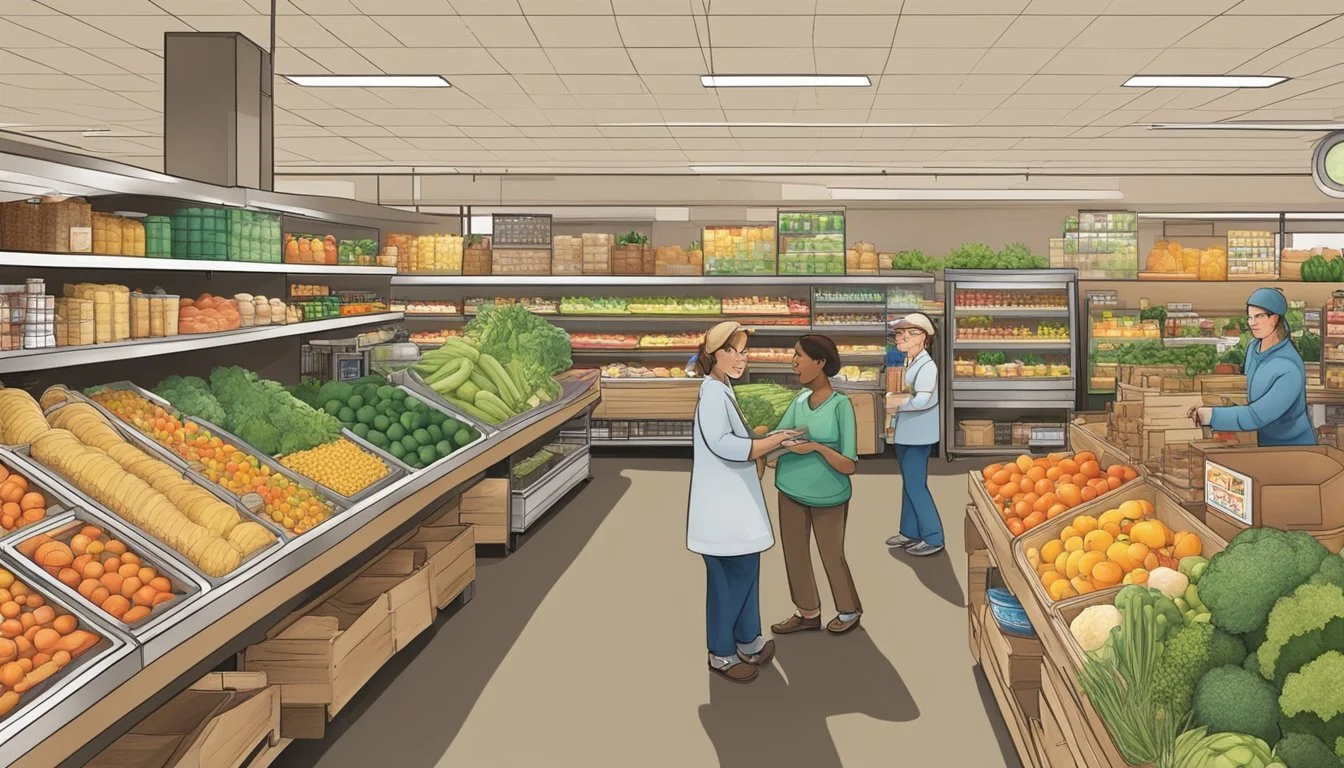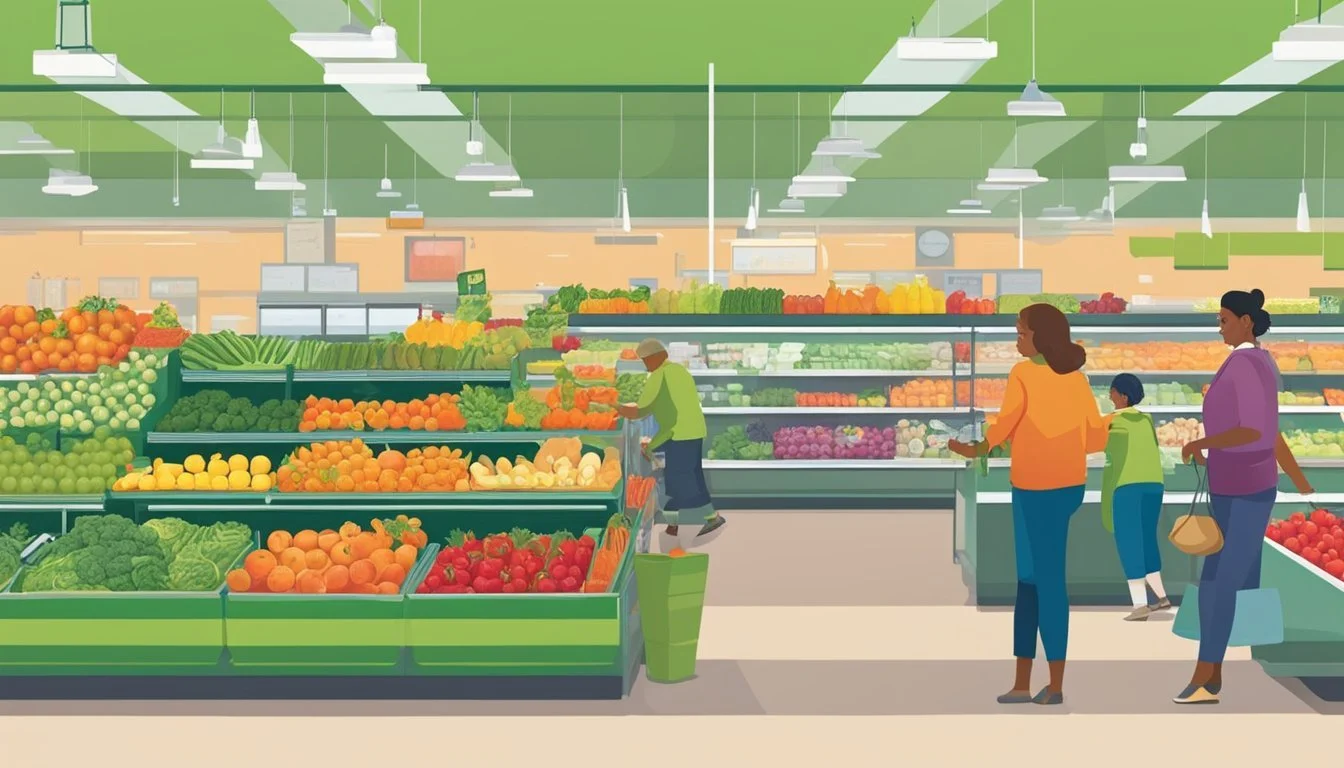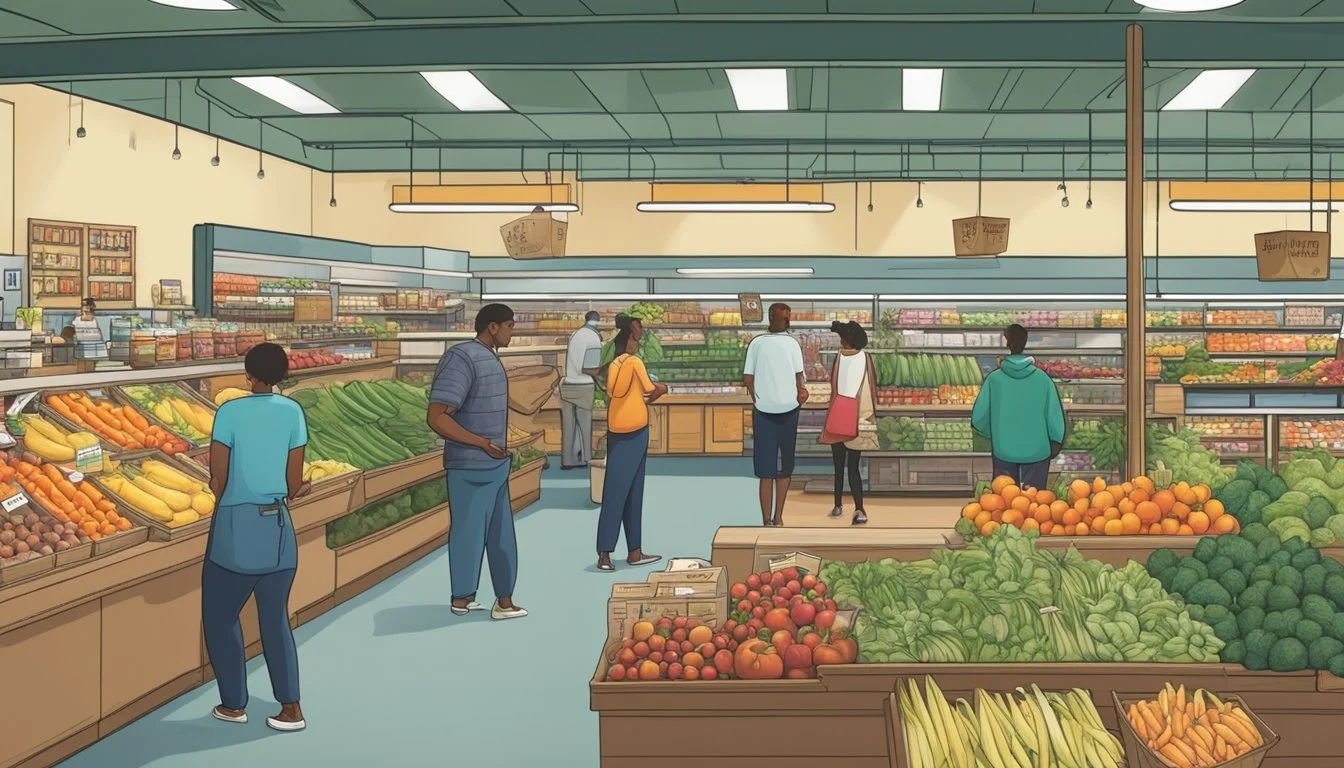Guide to Food Co-Ops in Rockford, IL
Your Access to Local, Sustainable Groceries
Food cooperatives, or co-ops, have become an essential part of the community in Rockford, Illinois, providing residents with access to high-quality, locally-sourced produce and goods. These co-ops are more than just grocery stores; they are socially-oriented enterprises that aim to serve the health needs and well-being of the local population while fostering a sense of community. Through education and a focus on sustainable practices, food co-ops in Rockford offer a unique shopping experience that prioritizes the connection between consumers and their food sources.
The Screw City Food Co-op is one such endeavor that epitomizes the co-op movement in Rockford. As a collective effort by local producers and consumers, this co-op works to build a community grocery store dedicated to offering a diverse array of products and services, aligning with the health requirements and ethical values of the area's inhabitants. By emphasizing the importance of education and the availability of services, groups like the Screw City Food Co-op help nurture the local economy and support the sustainable agriculture sector.
In Rockford, the presence of food co-ops like Basics Cooperative Natural Foods is not just a response to the growing demand for natural and organic products, but also a testament to the region's commitment to community-led solutions in the food industry. These cooperatives provide a valuable platform for residents to make informed choices about their food, engage with local producers, and contribute to a more equitable and transparent food system.
What Is a Food Co-op?
A food co-op is a grocery store that operates on a cooperative business model, focusing on meeting the needs of its community members, with an emphasis on local, organic, and natural food products.
Defining the Cooperative Business Model
A cooperative (co-op) is a business owned and democratically governed by its members, the people who use its services or buy its goods. In the context of a food co-op, these members are the customers, staff, local producers, and any other stakeholders who have a vested interest. Unlike traditional businesses, where profits are distributed among shareholders, any surplus income in a co-op is reinvested into the store or returned to the members based on how much they use the co-op.
Ownership: Community members can become owners by purchasing a share of the cooperative.
Decision-Making: Owners have a say in major decisions through a democratic process, often one vote per owner.
Profit-Sharing: Profits are often shared among owners or used to improve store offerings and services.
Benefits of a Food Co-op
Food co-ops provide numerous benefits to the community and their owners. They emphasize high-quality, locally-sourced products and foster a close relationship between consumers and producers. This model ensures that the community's needs for organic and natural foods are prioritized.
Local Focus: Food co-ops source from local growers and producers, supporting the local economy and reducing environmental impact.
Community Engagement: They often become community hubs, hosting events and educational programs.
Health & Sustainability: Prioritizing organic and natural products, food co-ops contribute to healthier food choices and sustainable practices.
By championing these values, food co-ops like the Screw City Food Co-op in Rockford, Illinois, represent a significant segment of the retail food market that's tailored to the specific health, ecological, and social needs of the communities they serve.
Local Impact of Food Co-Ops
Food cooperatives in Rockford, IL, serve as vital contributors to the local economy and sustainability efforts. They foster community engagement while supporting regional farmers and health-conscious shopping habits.
Economic Impact on Rockford
Food co-ops in Rockford are substantial economic stimulators. They help circulate dollars within the local community by sourcing products from local producers and regional farmers, ensuring that profits benefit the area's economy directly instead of going to external entities. A prime example is the Screw City Food Co-op, where local producers and consumers collaborate to build a community-focused grocery store that supports the collective health needs of Rockford's diverse population.
Local Spending: Every dollar spent at a food co-op contributes to the financial health of the local Rockford economy.
Job Creation: Besides offering quality local food, food co-ops serve as employment hubs, providing jobs that are often more stable and fair in compensation compared to non-cooperative counterparts.
Sustainability and Community Engagement
Sustainability is at the heart of food co-op operations. By prioritizing local products, food co-ops reduce the carbon footprint associated with long-distance food transportation.
Reduced Waste: They frequently donate surplus food to local food pantries, contributing over a million pounds of food annually.
Education and Wellbeing: Food co-ops serve as educational centers on sustainable practices and healthy living, enhancing community well-being.
By aligning with local needs and focusing on the longevity of both the environment and population health, food co-ops demonstrate that business can be conducted with a conscience.
Starting a Food Co-op in Rockford
The creation of a food co-op in Rockford requires diligent planning, securing an appropriate location, and gathering the necessary funding and ownership. Engaging in this process offers community members the chance to invest as a founding owner and shape the co-op through their vote and input.
Initial Planning and Research
The first step is to establish a strong foundation through careful planning. Prospective founding owners need to research the target market in Rockford, understand the specific needs of the community, and create a business plan. Identifying challenges and opportunities within Rockford's demographic landscape will inform the co-op's offerings and operations.
Market Analysis: Examine Rockford's current food market to determine demand for a co-op.
Feasibility Study: Conduct a study to assess the viability of a food co-op in the area.
Business Plan: Devise a detailed business plan, outlining objectives, structure, and strategies for the co-op.
Finding a Suitable Location
Choosing the right location is critical for the co-op’s success. The location must be accessible to the community, adhere to zoning requirements, and align with the business model. The selected site should also facilitate a sustainable flow of customers and deliveries, with consideration given to parking and public transportation options.
Accessibility: Ensure the location is convenient for potential members.
Zoning Compliance: Verify that the site complies with local commercial and food retail regulations.
Customer Flow: Select a location that can support steady customer traffic and supply logistics.
Securing Funding and Owners
A food co-op relies on securing adequate funding and a committed group of founding owners who purchase shares. The owners will have a critical say in the co-op’s direction and governance. Various funding avenues include loans, grants, and community-based fundraising efforts to ensure financial sustainability.
Investment Options: Outline available methods for obtaining funds, such as community bonds or loans.
Ownership Structure: Set up a structure for shares that allows community members to become founding owners.
Voting Rights: Establish a democratic system where every owner has a vote in key decisions.
Adhering to a clear, methodical approach in these three key areas can lay the groundwork for a successful food co-op in Rockford, strengthening not just the local economy but also the fabric of the community.
Operating a Food Co-op
In Rockford, Illinois, food co-operatives strive to serve their community by providing access to quality local foods and are governed by a structured management system. They heavily emphasize participation from their members who benefit directly from the co-op’s success.
Management Structure and Board of Directors
The Board of Directors in a food co-op acts as the governing body, setting the strategic direction and policies of the organization. Board members are often elected from among the co-op's owners, ensuring that the co-op stays true to its mission and responsive to its members' needs. In Rockford, food co-ops like Screw City Food Co-op operate through a democratic process where each owner has a say in crucial decisions.
Board Responsibilities:
Strategic leadership
Financial oversight
Managerial accountability
Membership and Patronage Dividends
Ownership in a food co-op is open to the public and involves purchasing a share of the co-op. Members are both customers and partial owners, contributing to the co-op’s capital. As a benefit of ownership, members may receive patronage dividends - a return of any profits based on how much they purchased from the co-op during the year.
Membership Benefits:
Voting rights in board elections
Eligibility for patronage dividends
Access to special member pricing and events
Products and Services Offered
A Rockford food co-op typically offers a range of groceries and products, focusing on local, organic, and sustainable items. Services often extend to education in the form of classes or community outreach. Their product selection reflects the needs and values of their members, responding to the demand for health-conscious and environmentally-friendly options.
Product Focus:
Organic and non-GMO foods
Specialized dietary offerings
Services Provided:
Nutritional education
Cooking classes
Community building initiatives
Local and National Resources
This section of the article provides an overview of the educational and financial resources available to food co-ops in the Rockford, IL area. It highlights both local initiatives like Screw City Food Co-op as well as national partnerships and support mechanisms in place for these community-focused businesses.
Educational Resources and Partnerships
Local food co-ops such as the Screw City Food Co-op in Rockford, IL, often serve as community educational hubs. They focus on educating the public about the benefits of local food systems and sustainable practices. Collaborations exist with entities like Food Shed Co-op in Woodstock, IL, that share similar goals in community education and food network strengthening.
Partnerships:
Local Farms and Producers: Offer workshops and events
Schools and Nonprofits: Develop curriculum for community education
These partnerships work together to provide a robust educational framework, ensuring that consumers and businesses alike are informed about the importance of local food systems and the role co-ops play in supporting them.
Financial Resources and Support
For financial growth and sustainability, food co-ops like Screw City have access to a variety of resources. These include support from networks and organizations at the national level to local funding. Their status as businesses and possible nonprofits means that they might be eligible for different forms of financial assistance, such as grants or loans.
Sources of Support:
IRS: Provides tax information and potential benefits for qualifying co-ops.
National Co+op Grocers: Could offer business services and support to member food co-ops.
These financial resources are crucial for the initiation, operation, and scaling of food co-ops, ensuring they maintain a solid foundation within both local economies and the broader national food landscape.
Legal and Tax Considerations
Navigating the legal and tax landscape for food co-ops in Rockford, IL involves understanding specific regulations and compliance with IRS forms. Food cooperatives, as member-owned businesses, must adhere to distinct legal statutes and tax guidelines.
Nonprofit Status and Tax-Exempt Organizations
Food co-ops may be structured as nonprofit clients, entitling them to certain tax-exempt benefits under IRS regulations. To qualify as tax-exempt, an organization typically must be organized and operated exclusively for exempt purposes. It is critical for these cooperatives to file the appropriate documents to achieve and maintain this status.
IRS Recognition: Obtain recognition of tax exemption by filing Form 1023 or Form 1024 with the IRS.
Annual Filing Requirements: Tax-exempt organizations are required to file an annual information return (Form 990, Form 990-EZ, or Form 990-PF), depending on their financial activity.
Understanding IRS Forms and Compliance
Cooperatives are subject to specific tax forms and compliance requirements set forth by the IRS. These forms are designed to ensure transparency and adherence to tax obligations.
IRS Form 990: Often referred to as the "Return of Organization Exempt from Income Tax," this form is used by tax-exempt organizations to provide the IRS with annual financial information.
IRS Form 990-EZ: A shorter version of Form 990, applicable to organizations with gross receipts less than $200,000 and total assets less than $500,000 at the end of the tax year.
IRS Form 990-PF: Utilized by private foundations, including nonprofit cooperatives with this classification, to report their financial activities.
Each form serves to disclose finances and operations to the public and maintain transparency, which is a cornerstone of cooperatives' accountability to their members and the community at large. Compliance with these filing requirements is essential for cooperatives to retain their favorable tax standing and operate within the scope of the law.
Data and Benchmarking Tools
In Rockford, IL, Food Co-ops such as Screw City Food Co-op benefit significantly from robust data and benchmarking tools. These tools enable informed decision-making, strategic planning, and an understanding of competitive positioning within the market.
Utilizing Cause IQ for Food Co-ops
Cause IQ provides a comprehensive platform for food co-ops to gather and analyze operational data. It sources information from the Business Master File, ensuring that co-ops access up-to-date organizational details. Secret-sauce algorithms are employed by Cause IQ to refine search results, allowing co-ops to apply filters for relevant data sorting, such as personnel information and vendor lists. The platform's methodology is structured to yield actionable insights, and its integration with Salesforce allows for seamless management of customer relationships and streamlined workflow processes.
Benchmarking with Peer Cooperatives
Peer benchmarking empowers food co-ops to assess their performance against similar organizations. Through comparative analysis, co-ops can identify areas for improvement and highlight successful strategies. The use of a fine-tuned methodology is critical in ensuring that the analysis accurately reflects the sectors being compared. Cause IQ serves as a valuable tool for this purpose, offering access to a wide range of data points, from financials to operational metrics. By benchmarking with peer cooperatives, food co-ops can adopt best practices and tailor their strategies to better meet the needs of their members and the Rockford community.
Community Programs and Outreach
Food co-ops in Rockford, IL, actively contribute to community wellness through educational initiatives and food distribution programs. They prioritize connecting consumers with local producers, aiming to create a sustainable local food system.
Educational Workshops and Classes
The Screw City Food Co-op takes a lead in community education, offering workshops and classes that aim to educate members and non-members alike on the benefits of local and sustainable food systems. They provide a platform for learning about nutrition, food preparation, and the environmental impact of food choices. These educational opportunities empower the Rockford community by promoting health through knowledge.
Topics Covered:
Sustainable agriculture
Nutritional information
Cooking and food preservation
Food Distribution Programs
Local food co-ops collaborate with emergency assistance programs to ensure that food distribution reaches those in crisis. Food distribution is crucial, as many residents rely on these services to supplement their food needs.
Services Include:
Access to fresh, nutritious food from community gardens
Support for WIC participants
Partnerships with local farmers to provide a diverse range of produce
Food distribution centers like the Christ the Carpenter UMC Food Pantry and the Cornucopia Food Pantry address food insecurity by offering pantry services to multiple ZIP codes within Rockford. These programs are part of a broader network of support that helps build strong, healthy neighborhoods through good nutrition and food accessibiliity.
Future of Food Co-Ops in Rockford
In Rockford, Illinois, the landscape for cooperative grocery stores is evolving, with entities such as Screw City Food Co-op leading the charge toward a community-centric food shopping experience.
Expanding the reach of Cooperatives
Rockford's Screw City Food Co-op has plans to enhance its presence as a community-owned grocery store, encompassing a larger demographic while still focusing on local needs and preferences. The cooperative business model is integral to its expansion, aiming to include sustainable goods and education about healthy living. This model offers local residents the opportunity to buy equity in the store, making them both customers and partial owners. This structure fosters a strong community bond and ensures that the store's offerings are closely aligned with the desires of its members.
Beloit, WI and Elkhorn, WI, not far from Rockford, also exemplify the growing trend of local food movements with similar co-op initiatives. By connecting these areas through cooperative principles, there is potential for establishing a more robust network that benefits regional vegetable farms and CSAs (Community Supported Agriculture), thereby expanding the reach and impact of co-ops in the region.
Innovations in Food Co-op Services
Innovation is key to the future of co-ops like Screw City. Food Shed Co-op, for instance, is another community-led effort that could impact the service offerings of local co-ops. By integrating advancements in technology and maintaining a commitment to education, co-ops are poised to offer personalized, tech-savvy shopping experiences while staying true to their mission of community health education and support for local producers.
Food co-ops may develop or enhance online platforms for easier access to the products of local vegetable farms and other suppliers. Innovations could include online ordering systems for CSA shares, as well as platforms for local farmers to provide fresh, seasonal produce directly to co-op members.
In summary, the future of Rockford's food co-ops appears to be centered around community ownership, regional collaboration, and technological innovation, with Screw City Food Co-op and others leading the way to more integrated, community-supportive services.
Additional Information
This section provides imperative resources and definitions relevant to food co-ops in Rockford, IL, delivering clarity on where additional data can be located and terminologies commonly associated with co-ops.
Appendix and External Resources
Website: The Screw City Food Co-op has an online presence where individuals can find comprehensive information and updates about the co-op’s operation in Rockford, IL.
National Taxonomy of Exempt Entities (NTEE) Code: Food co-ops may have specific NTEE codes that classify them under certain non-profit categories which can be referenced for tax and legal purposes.
Glossary of Terms
Bulk Foods: These are food items offered in large quantities, which are typically available for purchase at food co-ops and allow for reducing packaging waste.
Employees: Individuals hired by the co-op who are pivotal to its daily operations and management of various services offered to the member-owners and customers.
Revenues: This refers to the income generated by the co-op, potentially from the sales of goods and services, which is crucial for sustainability and growth.












